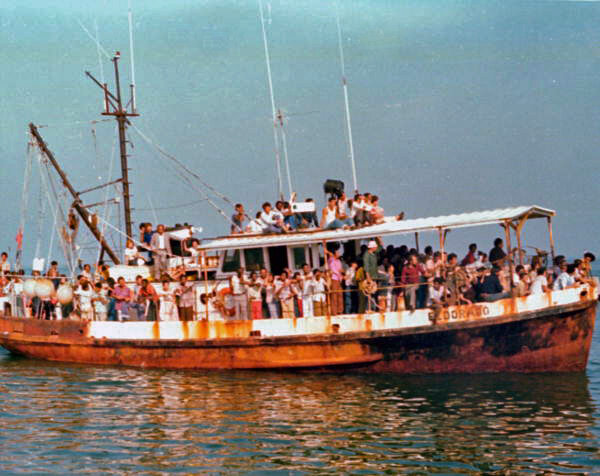Forty years ago today, the Cuban government quietly announced in the state newspaper, Granma, that anyone wishing to leave Cuba could do so, and that they should call their relatives in the United States to come pick them up by boat. At that time, over 10,000 Cubans had taken refuge in the Peruvian Embassy seeking political asylum and a way out of Cuba. Discontent on the island was high, and Castro needed a relief valve. The Mariel Boatlift was on.
Sixteen-year-old Mirta Ojito didn’t know at the time that this day would change her life forever. When her father read the announcement in the paper that morning, she was in school. He immediately went to a crowded pay phone and called his brother Oswaldo to come get them. It wasn’t until the next morning that her mother, sobbing by her bedside, told Mirta they would be going to El Norte, the United States. What they thought would take a day or two, took weeks. When the police finally arrived at their door, they asked Mirta and her family if they were ready to “abandon their country.” It turned into a harrowing journey.
Eventually thousands of vessels from as far away as New Jersey sailed across the Florida Straits to pick up their loved ones in Cuba. They took shrimp boats, yachts, freighters, and small pleasure crafts - some not seaworthy enough to sail in open waters. Many had inexperienced captains, and the U.S. Coast Guard was soon overwhelmed with distress calls.
When they finally arrived in Mariel Harbor, many learned that in order to get their relatives they would have to take others. The Cuban government wouldn’t let boats leave until they were overloaded with what they called the “undesirable scum” not fit for the revolution - like homosexuals, prisoners, people from inside the Peruvian embassy, people from mental institutions, and really anyone who professed a desire to “abandon their country.” (The fact that a very small minority of those who came over on the Mariel Boatlift were actual criminals would stigmatize this immigrant group for years to come.)
Over the next several months, over 125,000 Cubans came to the United States via the Mariel Boatlift - overwhelming South Florida, the Carter administration, and testing the long-standing U.S. immigration policy towards Cuban exiles.
As a fourteen-year-old kid in Miami, I remember the huge impact it had on our community. Tent cities sprouted up to sort and house the new immigrants; our schools took in new non-English speaking students, and had to add temporary buildings; and the population of our Cuban neighbors’ house across the street nearly doubled with freshly arrived émigrés.
Crime, which was already bad, went up as well. And so did the prejudice against these new Cubans. There became a distinction between the older Cubans who had been there since the sixties and these so-called marielitos who had just arrived - even among my friends, most of whom were Cuban. They were different, they left Cuba for different reasons, they are all criminals, they are not true exiles.
And then there were those I knew who hated all the immigrants who populated the melting pot that was Miami - from Haiti, Central America, even Canada. I remember a popular bumper sticker that said WILL THE LAST AMERICAN LEAVING MIAMI, PLEASE BRING THE FLAG. With the addition of the this latest wave of Cubans, the melting pot had thickened.
What most of us couldn’t see at the time is that this was America forming and evolving before our eyes - reshaping itself as it always has with every fresh wave of immigrants in its history, and as it does to this very day - forty years later.
I wish I had met Mirta then, and learned her story. It might have enlightened the fourteen-year-old me. Luckily I did many years later when I interviewed her for our documentary Voices From Cuba, after reading her excellent book Finding Mañana.
—
Finding Mañana - A Memoir of a Cuban Exodus, by Mirta Ojito is available in bookstores everywhere, including Amazon.
Voices From Cuba is a feature-length documentary film, directed by Thomas Miller and narrated by Andy Garcia, that will be released in fall of 2020.

